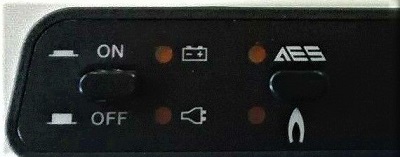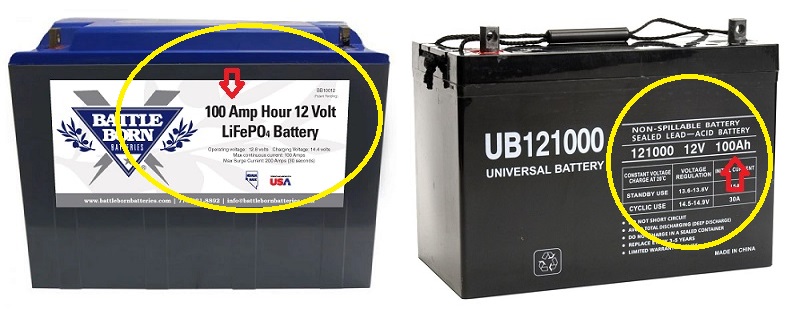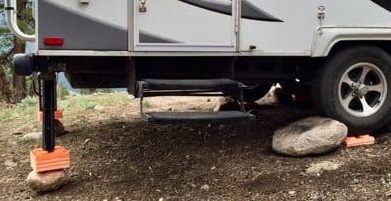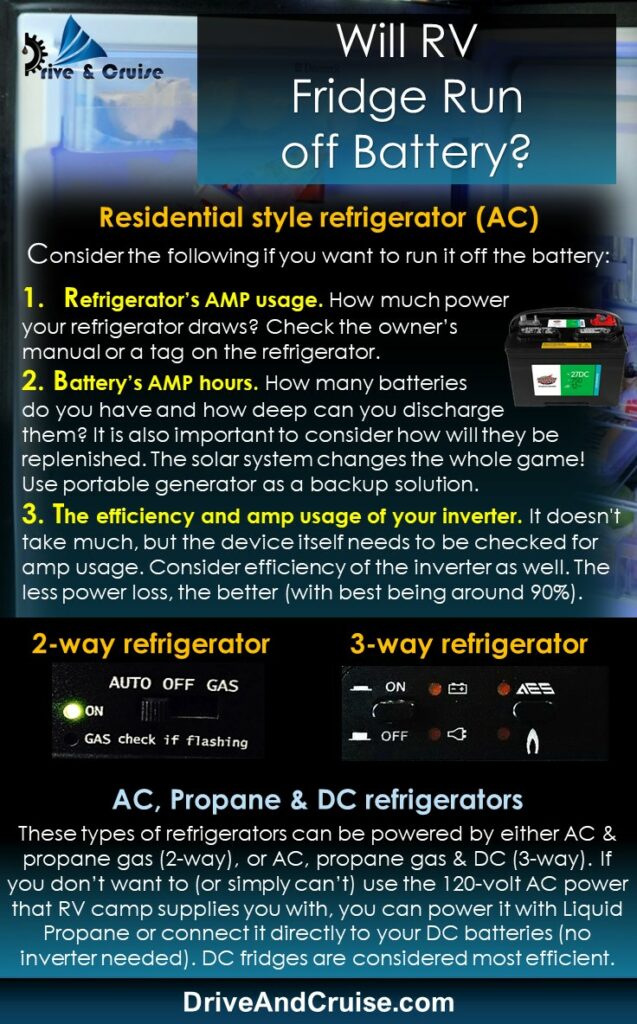![]()
Will RV Fridge Run off Battery?
DISCLAIMER: AS AN AMAZON ASSOCIATE I EARN FROM QUALIFYING PURCHASES. THIS POST CONTAINS AFFILIATE LINKS THAT WILL REWARD ME MONETARILY OR OTHERWISE WHEN YOU USE THEM TO MAKE QUALIFYING PURCHASES. FOR MORE INFORMATION, PLEASE READ MY EARNINGS DISCLAIMER.
|
The RV refrigerator will run off the battery, but the real question is for how long? Running a residential-style (AC-powered) fridge will drain the battery rather quickly, but a DC-powered (smaller) refrigerator can take care of our needs when we are boondocking or simply driving down the road.
Do you enjoy camping and RVing with your favorite people while having access to your cooled favorite drinks and fresh chilled food that is ready to go on the grill?
An RV fridge is an important gadget in RVing and comes to the rescue, storing all your preferred food supplies, throughout the journey. Now, the question is, will the RV refrigerator run off the battery?
RV battery is a 12-volt DC power supply that is usually used for lights and appliances that don’t require much power and the refrigerator is usually powered by a 120-volt AC current and is one power-hungry device! The inverter will also need to be used in order to change 12-volt DC (Direct Current) into 120-volt AC (Alternating Current).
Not to mention that the inverter itself will require some power that it will take from the battery along with the refrigerator. So, in which cases you can run the refrigerator off the battery?
- If your batteries are fully charged
- If you have a good, long-lasting house battery (preferably lithium-ion)
- If you have a good battery charging system or converter
- If your battery is big enough to handle your power needs
This basically means that with proper setup and calculations, if your battery can handle it, you CAN power your refrigerator with it! In some cases, it makes sense to limit your power usage and NOT use A/C at the same time, for example.
Batteries can run out very quickly and you don’t want to get to your destination with a drained battery, do you? Before deciding if you want to use the battery to power your refrigerator, consider the following:
- How much power does your refrigerator draw?
- What is the size of the battery bank you have?
- Will your battery be replenished via Solar panels or an Alternator?
The solar system changes the whole game! If you have solar, everything is much easier and you may even have enough sunlight to run your solar power system without even switching to batteries.
You can also use a portable generator to keep your batteries charged or discover that a tiny solar system like this Portable Folding Solar Kit from GoPower (paid link) can actually generate a lot of POWER!
Recharging your battery with a built-in generator (or alternator) is another option. All you have to do is connect your battery in parallel with the car battery, but since this type of charging was not intended for the alternator, it may shorten its lifespan.
If you are driving down the highway and want your food not to go bad, there are other options for keeping it chilled, that are more suitable on the road. For example, you can turn the refrigerator ON long before you plan to leave (maybe one day in advance).
This will give your refrigerator plenty of time to cool down and as we all know, if you don’t open it too often, it will be cold for quite a while. If your refrigerator is not old, it should be well-sealed.
If it’s just the drinks and you are not going too far, then good ol’ cooler with ice should do the trick! More ice can be purchased at any gas station along the way.
If you already reached your destination and there is no other power source available, it is highly likely that you would like to turn to your house batteries to power your refrigerator.
This is the whole purpose of having batteries in the first place, but in order to have more than 2-3 hours worth of power, you will need one of the following:
- Enough batteries. You can do calculations as I mentioned below.
- Recharging system. It could be a generator, solar, or an alternator that could charge them while you drive (but I don’t recommend it).
Refrigerator power consumption
Now let’s take a look at different types of refrigerators and how much power they drain. These are common refrigerators that you find in RVs:
- Residential style (AC)
- 2-way refrigerator (AC & Propane)
- 3-way refrigerator (AC, Propane & DC)
Residential-style refrigerator
This refrigerator uses 120-volt AC current power. It is also called a “Residential-style refrigerator” and it is the most power-efficient out of the three.
At the campsite, where shore power is readily available, all you have to do is plug it in. If you are boondocking and want to run it off the battery, you will need a device called: “Inverter”, that will transform your 12-volt DC power (that comes from your batteries) into 120-volt AC current (that your refrigerator can use).
You must consider the following if you want to run this refrigerator off the batteries:
- Refrigerator’s AMP usage. Check the owner’s manual or a tag on the refrigerator.
- Battery’s AMP hours. As well as how many batteries you have and how deep you can discharge them.
- The efficiency and amp usage of your inverter. It doesn’t take much, but the device itself needs to be checked for amp usage. Your inverter’s efficiency needs to be considered as well (the best are at around 90%).
Let’s say your refrigerator is running at 500 watts. Considering that your inverter’s efficiency is at 90%, then you will need this many watts from your battery:
400 watts × 1/0.90 = 444 watts
Now, let’s convert watts into amps. To calculate the current that we need from the battery, we need to divide our watts requirement by the volts provided:
444 watts / 12-volts (battery) = 37 amps
The next step is to take the total amp hours of your batteries and divide them by your refrigerator’s amp usage:
180 AH (amp hours) / 37 amps (refrigerator) = 4.86 hours
** Now, very important! Most batteries cannot be discharged for more than 50% unless they are deep-cycle batteries or lithium-ion.
This means that we only get to use half of the power they have (sorry)… If you don’t want to “kill” your Lead Acid battery really quickly, you cannot go over 50%, on the other hand, deep-cycle batteries or lithium-ion can be discharged up to 80%.
4.86 runtime hours / 50% = 2.43 actual hours
And this is only a refrigerator! Nothing else is included in this calculation (only drinks and fresh air, who needs TV anyway?)
As you can see from the above example, even if you have 180 AH (which is quite common for most RVs), you will only get to use it for about 2 hours and 26 minutes.
The solution to this problem? Get large, lithium-ion deep-cycle batteries or a portable solar system!
Here are approximate running time numbers for your refrigerator (tv and other appliances not included):
Lead Acid 600 AH batteries (about 6 in total) should give you 300 AH for about 24 hours
Lead Acid 1200 AH batteries (real power 600 AH) should give you about 3-6 days, depending on the usage
Lithium-Ion 800 AH batteries (real power 640 AH) should give you about 3-6 days, depending on the usage
** Numbers are approximate! Your numbers will depend on the actual power consumption of your refrigerator.
Don’t forget that generators and solar panels could be used to replenish your batteries or power your appliances. Most RVers give preference to the Solar Panel setup.
You may also want to get yourself Kill-A-Watt Meter (paid link) to get your accurate power consumption readings and a battery monitoring device (paid link) to solve power problems more quickly.
2-way refrigerator
This type of refrigerator can be powered by either AC (Alternating Current) or propane gas (LP). If you don’t want to (or simply can’t) use the 120-volt AC power that the RV camp supplies you with, you have an option to power it with LP (Liquid Propane).
These types of refrigerators have a control panel with an “Auto” button:

This simply means that if AC current is detected, it will be used to power the refrigerator, and if there is no electric power (for any reason, could be simply a blackout), it will switch to propane.
3-way refrigerator
Along with AC and Propane, this neat refrigerator can take power directly from your DC power source, which is a battery (in our case. It does not need an inverter and since some inverters are really inefficient, this is a great option to get the most power out of your battery!
This control panel includes a battery setting:

Which power source is better?
Here are the most common options for “keeping it chilled” in a wild. These power sources are:
- The battery
- Propane gas
- Portable generator
- Solar panels
1. The battery
Amp-hours (AH) is a standard metric when it comes to batteries. You can read the amp hour rating right on the battery label:

This battery rating means that you will get this amount of amps if you use it continuously for (generally) 20 hours. If we take the example above of a 100 AH battery, it is supposed to give you:
5 amps of power for 20 hours, until it discharges
If we take a refrigerator that demands 37 amps (as in the example above), a 100 AH battery will give you:
- Lead Acid (50% discharge) – 100 AH / 37 amps = 2.7 estimated hours. Now we need to divide this in half to get 1.35 actual hours (or 1 hour and 21 minutes) that we can use on this battery. This means if you want to use a 100 AH battery to power your refrigerator, you will probably need at least two of them to be happy.
- Lithium-Ion (80% discharge). Same formula, only instead of 50% discharge we allow it 80% discharge. In our 100 AH / 37 amps = 2.7 example, we will get to use 2.16 of these hours (or about 2 hours and 10 minutes).
- Deep Cycle batteries (80% discharge). Same formula as lithium-ion.
It is very common for an RV to come with four 6-volt batteries that are supposed to give you 400 AH (or 200 amps that you could use). Many RVers claim that they DO NOT give you that much power and you CANNOT run them “for days” as salespeople suggest before you buy your RV.
You need a solid set of batteries (like Deep Cycle or Lithium-Ion) to get really comfortable and worry-free while being away from shore power.
2. Propane gas
Propane gas is another good power source for your refrigerator to keep cool while dry camping. Only make sure you are NOT using it while driving down the road!
You really have no control over how things are being shifted inside RV as you are driving and propane is a flammable gas! Better safe, than sorry…
Even though it is convenient to use propane-powered refrigerators when no shore power is available, there are some downsides:
- Now you have a propane tank to fill up!
- You cannot use it while driving (dangerous).
- You need to defrost the refrigerator and freezer about once a month.
- It takes longer to get cooled down.
- These refrigerators are not very efficient in hot and humid climates, as well as in elevated areas.
Your motorhome or trailer also needs to be leveled in order for the propane refrigerator to work properly. There are different ways to go about leveling and some are better than others, but it is still a hassle:

3. Portable generator
If you are one of those who really need to be out there in a wild, away from people and energy-draining things (like computer games), and getting in touch with your true self, then, using a portable generator will definitely calm your mind and soul down even more!
Maybe you have some kind of building project with your family in a remote area with no energy supply nearby and powering all the tools along with generating the overall happiness of our crew is a very important consideration. If you feel like you are not ready for a solar setup, a portable solar generator with a bunch of good-sized batteries will make time spent – productive and enjoyable.
Generators are very useful devices and some of them come in solar (without noise and fumes) and lithium-ion versions. They require more explanation and I will try to cover them in some other article.
Even if you have solar panels, a cloudy day may come and you may regret not getting a generator for backup (paid link). They are small, so why not?
4. Solar Panels!
More and more RVers are getting solar panels installed and for a good reason. Less time spent dealing with power supply and batteries and more time with your family and friends!
If you don’t have the means to recharge batteries, you will need quite a bunch of them if you ever want to get away from the shore power! They are also large and heavy!
In RVs, every bit of space is valuable… and batteries take space!
Did I mention basic time-consuming regular maintenance? Water, full charge, keep clean, etc… (lithium-ion is an exception).
In conclusion, I would like to mention that if you keep your batteries in a good shape and quite a bunch of them, then you can definitely run your RV fridge off the battery. But it is usually good to have some kind of battery recharging system in the form of a portable generator or solar power if you want to live without utility power for a while.

You can also search our database:
Attention! This article is for informational purposes ONLY and is NOT a replacement for professional advice! ALWAYS consult your local specialist for an appropriate solution to your problem. All statements, prices, contact information, recommendations, and reviews contained herein came from sources that we believe to be reliable, but the accuracy or completeness thereof is not guaranteed. Please contact the service provider for complete details and updates.



